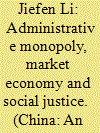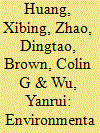| Srl | Item |
| 1 |
ID:
099673


|
|
|
|
|
| Publication |
2010.
|
| Summary/Abstract |
This article attempts to address the problem of administrative monopoly through a case study of the taxi monopoly in Beijing. The case reflects the conflict between building a market economy and working within the constraints of the old institutions, revealing that the biggest obstacle in contemporary China for building a market economy comes from administrative power or government interference with market operation. Only when administrative monopoly is eliminated will anti-monopoly actions against other monopolistic behaviour be justified and meaningful. A management model for resolving the Beijing taxi monopoly is proposed.
|
|
|
|
|
|
|
|
|
|
|
|
|
|
|
|
| 2 |
ID:
099672


|
|
|
|
|
| Publication |
2010.
|
| Summary/Abstract |
China's rapid economic development and improvement in living standards have led to a boom in its outbound tourism industry. In 2008, China's outbound tourism expenditure reached USD36.2 billion, ranking fifth in the world. Under the impact of the global economic crisis, outbound tourism is not only a source of revenue to other countries, but also a type of "gift" by China's leaders when they go abroad on official visits. While China is home to an enormous tourist market with high consumption potential, its authoritarian regime and state-owned travel agency have enabled it to exert control over the flow of outbound tourists. These two measures of control have become China's bargaining chip in diplomacy and the work of a "united front". Between 2008 and 2009, China put a damper on outbound travel to Macau and Kaohsiung, Taiwan, validating that its control over outbound tourism is both an economic boost and a threat to other countries.
|
|
|
|
|
|
|
|
|
|
|
|
|
|
|
|
| 3 |
ID:
099671


|
|
|
| 4 |
ID:
099674


|
|
|
|
|
| Publication |
2010.
|
| Summary/Abstract |
This paper provides a comprehensive review of foreign direct investment in China over the last three decades. It reviews the growth, sources and distribution of FDI in China and analyses factors determining FDI inflows. It summarises the contributions of FDI to the Chinese economy in terms of economic growth, total factor productivity, exports and technology progress. Finally, the paper discusses potential impacts of FDI in China on the rest of the world in terms of FDI-competing countries and FDI source countries.
|
|
|
|
|
|
|
|
|
|
|
|
|
|
|
|
| 5 |
ID:
099670


|
|
|
|
|
| Publication |
2010.
|
| Summary/Abstract |
China's reforms left many redundant workers with no social guarantees. At the same time, with the "push-and-pull" of market forces, rural populations are moving in bulk to urban areas where they are devoid of state benefits but use urban amenities. When the traditional social protection is breaking down and the market is taking command, new contradictions are arising over the distribution of state resources, making a workable social support structure desirable. This paper analyses how social welfare benefits are distributed among urban and rural populations in the urban centres, what changes have taken place with the introduction of a market economy and the nature of evolving welfare programmes in China.
|
|
|
|
|
|
|
|
|
|
|
|
|
|
|
|